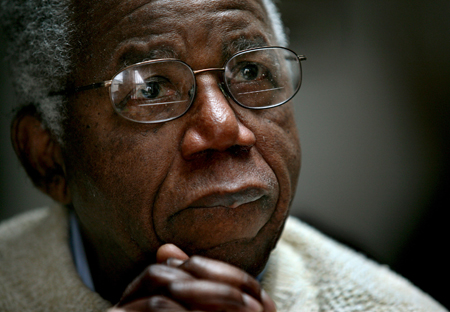
Nigerian writer Chinua Achebe, author of “Things Fall Apart,” died on March 11. Photo by Craig Ruddle/The Associated Press
The story of Africa and the insight many have into her traditions and customs is due largely to the writings of Chinua Achebe. His blockbuster first novel, “Things Fall Apart,” is a brilliant read and a showcase of exceptional writing. The novel has sold millions of copies around the world, and the compelling narrative of African values and the clash with Western civilization is gripping and empowering.
Through a perfect African village setting, Achebe in that singular novel achieved a level of communication, enlightenment, education and poetic brilliance the thousands of novels and books after his own have not achieved. And unless one reads “Things Fall Apart” an appreciation of his other works will not occur.
His death [on March 21] means he ended his life on a sad note because his country never achieved its potential. Through his subsequent writings and lectures, he advocated for Africa but more for Nigeria. He was not one to mince words. For him the problem of Nigerian development—nay, African development—is squarely that of leadership. He called out African leaders who failed to govern properly.
Achebe was of a rare stock, and he played with words in his writing that brought out the uncluttered thoughts in his mind. He was a lucid mind who used his writings like a gun to probe the minds of his readers and prick the minds of corrupt and inept African leaders. That his name assumed global recognition was largely due to the resonance of the message he sent through his works and the clarity of his writings. Any day, Achebe is a delightful read.
Not even his wheel chair experience [after a 1990 car accident] could deter him or subdue his mind. He gave our generation plenty to chew. Not one to give in to despair, Achebe used words as tools for the engineering of a new mindset and a more progressive society. His death is hurtful, a major loss to the literary world and most especially to the progressive camp in Nigeria that found a voice in his writings.
Achebe had two cults around him. First was that of the intellectuals and literary minds; the second was an unusual one—the cult of journalists. Perhaps before he died he had more followers among journalists. The media befriended him, and Achebe never disappointed in giving out right soundbites and punchy and incisive analysis and responses to developments. He was in the forefront of the battle against military rule in Nigeria, during a period when the civil society and the media merged to fight a common enemy. The media came under severe attack. Achebe used his voice and writings to denounce the military and defend the rights of journalists. His writings inspired many journalists through their simplicity and communicative strength.
I personally learned from his works and commentaries the power of saying it succinctly and putting it down clearly. His life was exemplary. He demonstrated the power of the printed word, and many journalists like me who live by the word adored him and drank in his every writing.
His writings will no doubt outlive him, and the power of his convictions will penetrate many minds and spur them to action to work for a better society. Achebe is smart and of great vision. Just as he left Nigeria before “Things Fell Apart,” he has again exited this earth in time before everything falls apart.
Sunday Dare, a 2010/2011 Academic Research Fellow at Oxford University and a 2001 Nieman Fellow, is special adviser for media to Bola Tinubu, former Governor of Lagos State in Nigeria. He previously served as general editor The News and Tempo, two weekly newsmagazines based in Lagos, and worked for Voice of America in Washington, D.C. for nine years as the chief of the Hausa Service, Africa Division. He is a social media expert operating multiple citizen journalism news sites.


